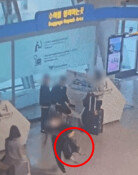Overseas Visitors Say Korea Is Boring
Overseas Visitors Say Korea Is Boring
Posted August. 01, 2006 03:02,
There was nowhere to go except for the hotel and the airport.
To Bill Wesley (54) from England, who does a trading business, Korea was a boring country with nowhere to go after work.
Mr. Wesley complained that most of the major tourist attractions like Deoksugung closed at 6:00 p.m., and the products at the department stores were ridiculously expensive.
Japanese tourist Masahiro Yoshito (37) spent most of his 4-day visit buying Chinese imitation designer products at Dongdaemun Market in Seoul. After I visited a few palaces, there was nowhere else to go in Seoul, he said. The only upside of visiting Korea was the easy access to imitation products.
Work in Korea, Pleasure in Other Countries All the Money Being Spent in Australia and Thailand-
Recently, the Bank of Korea stated the main reason for the last half years (January June) balance of current accounts going into the red for the first time in nine years is the tourism balance, which has been in the red for 60 months running.
In fact, the money spent by Koreans from January to May of this year in foreign countries increased by 15 percent, but the money spent in Korea by foreigners during the same period decreased by 4.5 percent.
Why Is This Happening?-
We asked VISA to analyze The Monetary Amount of Credit Card Transactions of Foreign Visitors in the Asia-Pacific Region during the Year 2005 by Countries. VISA is the worlds largest credit card company with a market share in the Asia-Pacific credit card market of over 60 percent.
The results of this analysis show that 45 percent of the credit card transactions by foreigners in Korea were at hotels ($306 million) and duty-free shops ($196 million). This means that almost half of the cases in which foreigners used their credit cards were for sleeping in hotels and shopping at airport duty-free shops before leaving the country.
In Korea, there arent very many places for foreigners to spend money either. VISA categorized the places in which credit cards were used into about 600 categories, and the top 10 categories comprised over 78 percent of the total in Korea.
Contrastingly, the top 10 comprised only 17 percent in Singapore, 21.8 percent in Hong Kong, and 22.8 percent in Australia.
Outside the range of the 10 Asia-Pacific countries analyzed in this report, the country with the largest credit card transaction amount by foreigners was Australia with $4.5 billion, with Thailand ($2.8 billion), China ($2.8 billion), Hong Kong ($2.2 billion), and Japan ($1.7 billion) following behind.
The total for Korea was only $1.1 billion, a mere quarter of Australias.
Australia = Nature, Singapore = IT Distinct Characteristics Bring in the Dollars-
The common factor of the countries that succeeded in encouraging foreigners to spend money was uniqueness.
Australia used its unique natural environment as a tourist attraction, which was a big success. Foreigners spent $252 million at Australian travel agencies and over $100 million to rent cars.
Singapore actively attracted IT tourism. Foreigners spent $114 million buying computer related products.
Hong Kong was a shopping paradise. Foreigners swiped over $200 million buying jewelry, and the total amount of money spent in department stores, duty-free shops, and clothing and accessories shops was over $1 billion.
sanhkim@donga.com







